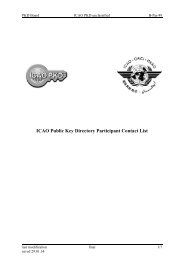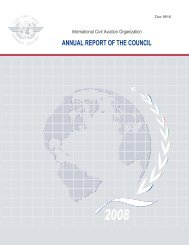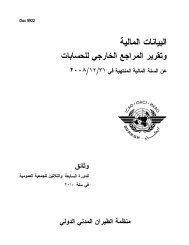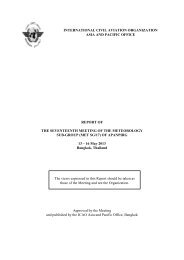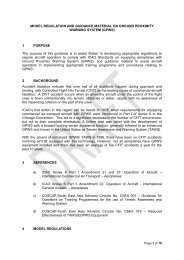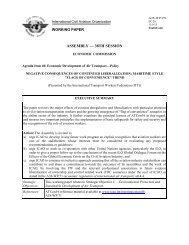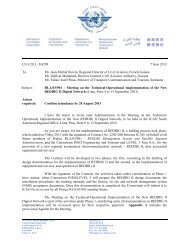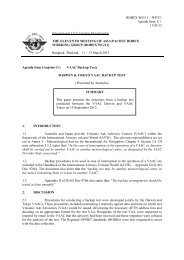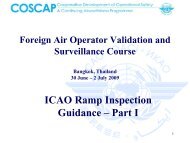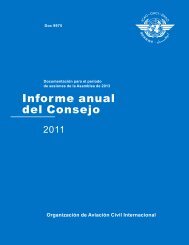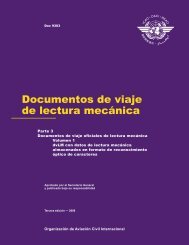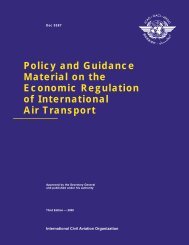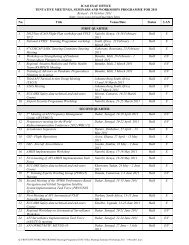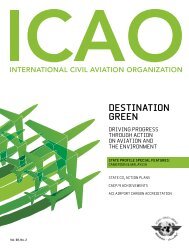Joint Western & Central African (WACAF) Office and - ICAO
Joint Western & Central African (WACAF) Office and - ICAO
Joint Western & Central African (WACAF) Office and - ICAO
Create successful ePaper yourself
Turn your PDF publications into a flip-book with our unique Google optimized e-Paper software.
fully underst<strong>and</strong>s this <strong>and</strong> we have enjoyed their support in<br />
providing the infrastructure necessary to supply vital safety<br />
information to Nigeria’s aviation sector.”<br />
The government of Nigeria is investing millions of dollars to<br />
ensure that NIMET is properly equipped to perform its duties,<br />
<strong>and</strong> the agency now boasts a wide range of new technological<br />
developments that are revolutionizing its capabilities. NIMET’s<br />
Doppler Weather Radar Project is a network of six radar<br />
facilities that will more effectively track weather systems.<br />
Another NIMET project critical to air transport safety is the<br />
Low-Level Wind Shear Alert System (LLWAS). Wind shear is a<br />
sudden change in the direction or speed of wind that poses<br />
grave risks to aircraft on l<strong>and</strong>ing <strong>and</strong> take-off.<br />
“We are implementing LLWAS immediately at all of Nigeria’s<br />
four international airports, <strong>and</strong> then we will move on to<br />
secondary airports,” assured Anuforom. “Thunderstorm<br />
detectors, another important safety implementation, have<br />
already been installed at eight airports across the country.<br />
The Nigerian College of Aviation Technology (NCAT)<br />
The Nigerian College of Aviation Technology (NCAT), located in<br />
Zaria, Kaduna State, is the foremost aviation training institution<br />
in the West <strong>African</strong> sub-region. The institution’s primary<br />
responsibility is the provision of excellent abinitio training for<br />
commercial pilots, air traffic controllers, aircraft maintenance<br />
engineers, aeronautical telecommunications engineers, aviation<br />
technicians, <strong>and</strong> aeronautical meteorologists —among several<br />
other aviation specialist professions.<br />
NCAT was established in 1964 for Nigeria <strong>and</strong> other <strong>African</strong><br />
countries in collaboration with <strong>ICAO</strong> <strong>and</strong> the UNDP. The College<br />
boasts over 40 years of experience in the development of human<br />
resources for the aviation industry in Africa. Academic activities<br />
in NCAT are carried out in five main training schools, namely:<br />
■■ Flying School.<br />
■■ Aircraft Maintenance Engineering (AME) School.<br />
■■ Aeronautical Telecommunications Engineering (ATE) School.<br />
■■ Air Traffic Services/Communications (ATS) School.<br />
■■ Aviation Management School.<br />
Nigerian Accident Investigation Bureau (AIB)<br />
The Federal Government of Nigeria, through the Civil Aviation<br />
Act of 2006, Section 29, established the State’s aircraft<br />
Accident Investigation Bureau as a corporate body <strong>and</strong> an<br />
autonomous agency reporting to the President through the<br />
Minister in charge of aviation. It commenced operations in<br />
April 2007 <strong>and</strong> is headed by Commissioner/CEO Sam Oduselu.



